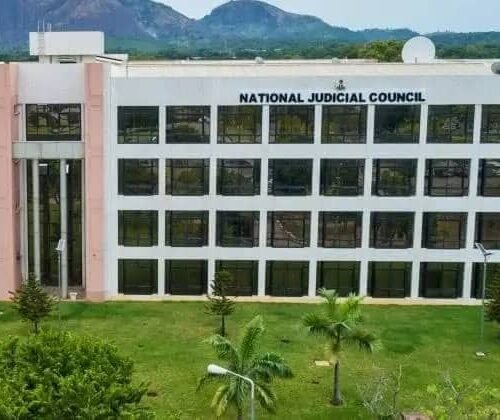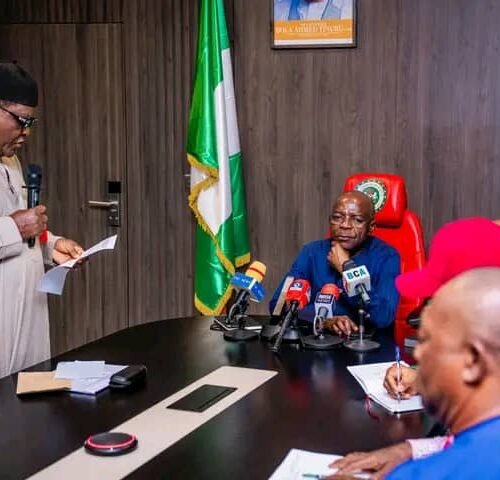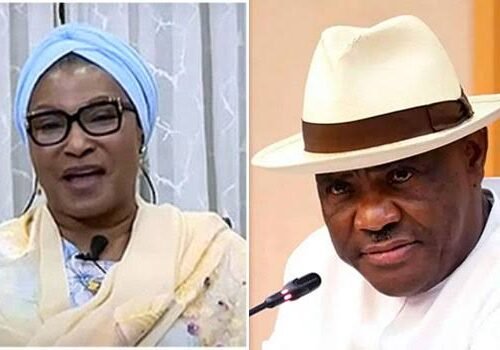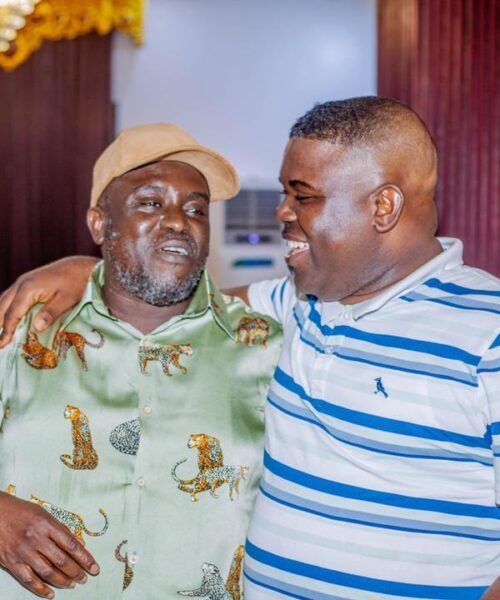Minister Warns DisCos Against Extorting Communities For Transformer, Other Electrical Repairs
The Tinubu administration has finally warned electricity Distribution Companies of Nigeria (DisCos) against their disturbing penchant of asking residents of communities to contribute funds to buy electricity transformers and other materials on their own.
Minister of Power, Adebayo Adelabu, gave the warning against the misnomer at a meeting with the management of Ibadan Electricity Distribution Company (IBDEC) during a facility tour in Oyo State.
The minister said the Buhari administration is always committed to providing every need of the people to improve their living standard. He also expressed disappointment over the continued complaints of power consumers on the metering system.
While promising to address the situation by canceling the estimated Billings in the power sector.L, he also disclosed that the ministry is open to collaborating with the private sector to better serve Nigerians in the area of power distribution.
Last July, the Assistant General Manager of Consumer Affairs at the Nigerian Electricity Regulatory Commission (NERC), Tony Essien, said it is not the responsibility of consumers to fix faulty transformers.
He said so at the Electricity Consumers Enlightenment and Protection Workshop for staff of the Federal Competition and Consumer Protection Commission (FCCPC) and the National Orientation Agency (NOA). Essien said if transformer repairs are done by any community, they should be repaid by their DisCo.
“On communities repairing transformers, that forms an investment. If the transformer goes faulty, the DisCos are to repair it. However, if a DisCo agrees for the community to fix it, it should be clearly spelt out that it is covered as an investment, what it costs, and the repayment.
“If an agreement of investment is in place and the DisCo does not honour it, you can seek redress from NERC”, he said.
Principal Manager of Market Competition and Rates at NERC, Chigozie Valerie Azikiwe, advised electricity consumers to discuss their need for new transformers and poles with their respective DisCos before a purchase is made.
According to her, “in terms of repayment, there is a process. One mistake a lot of people make is to purchase transformers or poles without discussing them with their DisCo.
“The right process is to talk to the DisCo before purchasing the transformer. The repayment is not cash. What is obtainable now is energy credit, but you must follow the process of engaging the network owner from day one. We consider consumer protection in everything we do here at NERC.”
FCCPC’s Deputy Director of Surveillance and Investigation,
Omagu Nwachukwu, suggested that NERC should provide clarity to electricity consumers on what their rights are. She highlighted the repairs of transformers.
“Tell consumers that if they want to repair a transformer, they should write formally to their DisCo and copy NERC so the DisCo in question will know that NERC is aware”, she said.
Ms. Azikiwe urged consumers to spread knowledge on the right processes to follow. “Be our champions; tell consumers to follow the right process. A lot of people don’t know these regulations exist. That is why we have these enlightenment workshops. If you know, let your neighbours know”, she said.
Noticeably, NERC last April launched an electricity service charter and among other rules. It maintained that after an electricity complaint is filed, the DisCo involved must visit the location within 24 hours to take steps to fix the problem.
If the fault was caused by a bad fuse, it must be replaced and reconnected within 24 hours, the same applies for other minor equipment faults. However, repairs must be carried out within 48 hours for other unnamed issues.
Disturbingly, a decade after the Nigerian government handed control of a large part of its electricity sector to private investors, the sector still struggles with meeting the power needs of Nigerians.
In February 2022, NERC condemned electricity distribution companies forcing customers to buy or repair electricity assets as a condition for the restoration of power supply. The practice, however, has continued.
While stating its “consumer right and obligation” NERC also emphasised that it is “not the responsibility of electricity customers or communities to buy, replace or repair electricity transformers, poles and related equipment used in the supply of electricity.”
According to the commission, some of the obligations of electricity consumers include monthly payment of power consumed, “vigilant protection of electrical installation, cordiality towards electricity workers, ensure that metering and other electrical equipment within your premises belonging to the DisCo are not tampered with, or by-passed, notify the DisCo serving you of any tampering or bypass of electrical installations, notify the DisCo serving you of any outstanding electricity bill before moving into new premises.”
It also stated that the repair or replacement of faulty electrical infrastructure should be fixed within 48 hours of official complaints. It, however, noted that where the DisCo is unable to “speedily replace the faulty transformer, residents may go into discussions with the company and agree on the terms of the replacement of the affected transformer if they wish to assume the responsibility of the company.”
On the average, Nigeria is producing 5,000 megawatts of electricity for a population of around 230 million. The country has one of the world’s worst power sectors. At least 85 million citizens do not have access to the national grid, the World Bank said. The global bank also stated that Nigeria loses $29 billion annually to power shortages.
A consumer rights lawyer, Folarin Aluko, has been saying that it is the responsibility of the DisCos to provide “working and operational equipment” regardless of the debts owed by consumers. “The responsibility imposed by law is not conditional upon the action of anyone”, he said
However, going by NERC’s “Regulation for Investment in Electricity Networks 2015”, there must be an agreement between customers and the DisCos. The agreement should state the costs and the mechanism for recovery of the investment of customers willing to intervene in the power supply restoration and who may invest in the provision of materials and installation.
But, the consumer rights lawyer, says when the cost of fixing a faulty electricity distribution asset is borne by customers, they have a right to a refund and compensation, adding, “the relationship between the customer and the distribution company is contractual in nature. Customers have rights that are recognised and protected by the NERC Act.
“The contractual responsibility to provide and maintain transformers and other distribution equipment is borne by the DisCos.” According to him, it is a breach of the contractual relationship between customers and DisCos for the customer to fund the repair and management of electrical assets.







